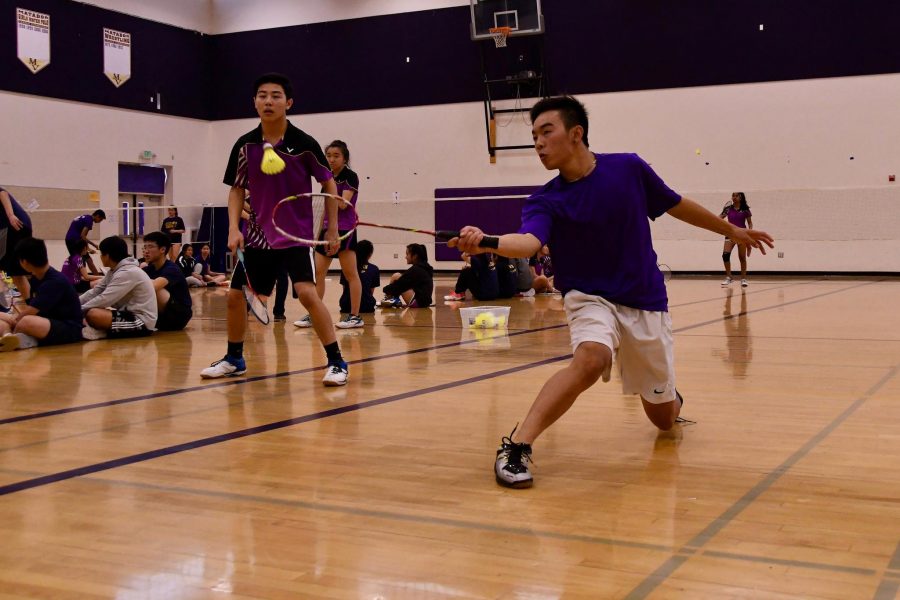After playing on the MVHS boys tennis team for three years, senior Kevin Tan decided to join the badminton team instead. As a new member, Tan noticed the differences between the two teams in terms of gender.
Of the 23 sports teams at MVHS, there are only six coed teams: badminton, track and field, cross country, wrestling, swimming and diving. Since these teams have no gender barriers, they are usually much larger.
“It’s just very different game style [in badminton] because especially when I’m observing the top players, the guys are usually hitting a lot bigger while with girls, it’s a lot more tactics … and the right strategy,” Tan said. “With some guys that I know it’s mostly brute strength and just trying to overpower the other player.”
Although Tan enjoyed his experience on a coed team more, senior Sina Faridnia enjoyed his experience more on a single gender boys water polo team. When he joined the varsity boys water polo team freshman year, Faridnia wasn’t familiar with the other players.
“Once I got in the pool, I made some really nice passes,” Faridnia said. “They kinda respected me more after that … You kind of create a [brotherhood] with your teammates and you become really close friends.”
Faridnia believes rather than gender, the teamwork and constant interaction with his teammates helped them become close.
“Just the fact that we were able to play a team sport and we were able to connect in that way helped us,” Faridnia said. “Maybe if there was a girl on the team the same thing would have happened.”
Faridnia is also a part of the MVHS swimming team. Like many coed teams, swimming is mostly an individual sport. Compared to the team-centered water polo practices, Faridnia feels this individual-focused practice doesn’t allow the team to develop deep connections. Aside from brief banter with fellow relay members, he finds athletes just don’t interact enough to make those same deep connections.
Junior Jessica Ji, a member of both track and field and the MVHS girls basketball team, agrees with Faridnia. She feels that gender does not play a significant role in the team dynamic; rather, she feels that the nature of each sport makes a bigger difference.
The size of the teams is also a factor; while her basketball team only has 10 players on it, the track and field team has around 134. Because of this size difference, Ji explains that the bonds created while playing aren’t the same, regardless of gender. Ji also feels that playing with another gender is a motivating factor for her to improve.
“It pushes me to work harder because I see other people being successful at the events that I’m doing,” Ji said. “There’s no negative feelings. Everyone cheers each other on, so it’s a very positive community.”
Similar to Ji, senior Eesha Golap, a member of the MVHS badminton team, feels that playing alongside another gender has helped her gain more opportunities in matches. Before this year, Golap only played singles against another girl, but this year, she plays mixed doubles.
“I like coed sports better because there’s more opportunity,” Golap said. “Like if a guy’s better than you, you can play with the guy and get better. For a guy, if a girl’s better than the guy, he can play with the girl.”
Senior Patrick Kan also plays mixed doubles and believes the mix of genders can help freshmen making the transition from middle school.
“For our freshmen who maybe didn’t have as much interaction with the opposite gender in middle school, it really gives them a chance to talk to them and socialize,” Kan says.
However, Faridnia does find that the addition of multiple genders means some students don’t feel as free to be themselves.
“[In] water polo it’s just guys so you can do really goofy things in the locker room or outside that you can’t really do during swimming with girls around,” Faridnia said. “You don’t let yourself be yourself 100 percent because we try to impress the girls or whatever. But during water polo you can just be yourself 100 percent. You don’t have to worry about anyone judging you or anything like that since you’re among like close friends and kind of like your brothers, you know.”
Tan acknowledges this difference because, when he used to be on the tennis team, he felt that some boys seemed to have the mindset that they could act and play differently when only boys were present.
“When you’re doing something really competitive, if you’re cooperating with another gender, it kind of controls you I guess and it just helps you become a better person in general, especially in sports, so I find that [is] a huge benefit.”
Side by Side
Sannidhi Menon
•
April 11, 2018
More to Discover
0






